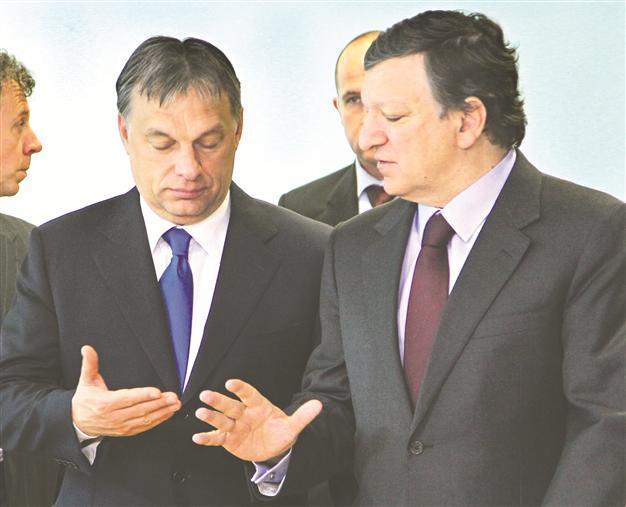IMF ‘ready’ for Hungary fiscal aid negotiations
WASHINGTON – DUBLIN

European Commission President Jose Manuel Barroso (R), talks with Hungarian PM Viktor Orban in Brussels April 24. The IMF joined the EU in supporting Hungary. AP photo
The International Monetary Fund (IMF) has announced that it is prepared to start negotiations with Hungary’s debt-laden government, moving to end a months-long standoff that had blocked fiscal aid to the country. The IMF joined the European Union (EU) in seeking to rebuild ties, as long as conditions are met, after anger at Prime Minister Viktor Orban’s encroachments on the independence of the judiciary, media and central bank.“The Fund is ready to start negotiations as soon as adequate steps are taken to ensure central bank independence, as has been discussed with the Hungarian government,” an IMF spokeswoman said on April 26.
In November, Hungary approached the EU and the IMF about a possible 15-20 billion euro ($20-26 billion) stand-by credit line after its currency, the forint, plunged and the country’s borrowing costs soared. The IMF’s positive signal came a day after the European Union gave Hungary a go-ahead for talks to resume on financial assistance. Brussels said the country had taken sufficient action and commitments to enter into negotiations.
‘Ireland on track’
Meanwhile Ireland, an another problematic country within the European Union, is successfully cutting its deficits, bolstering its banks and pursuing job-creation strategies, its international bailout creditors has said as they signaled support for a further round of loans. Ireland welcomed the verdict from the European Union, European Central Bank and International Monetary Fund following the organizations’ latest 10-day review of Irish efforts to rein in runaway debts as part of the country’s 2010 bailout agreement.
The government said EU and IMF officials had agreed to permit it to funnel an increased proportion of future profits from the sale of state assets into job-creation projects rather than more debt-reduction efforts.As part of its bailout accord, Ireland has pledged to sell up to 3 billion euros in state assets.
However, Ireland’s trade union umbrella body failed on April 25 to endorse the European Union’s fiscal pact treaty which will be put to a referendum on May 31.
A spokesman for the Irish Congress of Trade Unions (ICTU), which represents 55 affiliated unions, said the failure to direct its 600,000 members on how to vote on the treaty was “exceptional”. Voting ‘no’ would mean Ireland could not get access to the new European Stability Mechanism, designed to prevent future crises in the eurozone.
Compiled from AFP, AP reports by the Daily News staff in Istanbul.
















